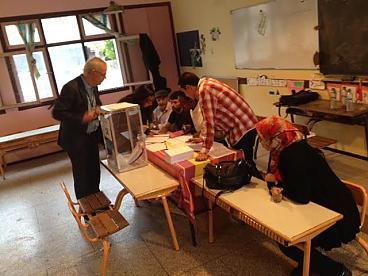Senator Kox on Moroccan elections : Most of the population stayed away
Senator Kox on Moroccan elections : Most of the population stayed away

On Friday, in an atmosphere of calm, Morocco's citizens elected a new parliament. At least, that was true of that section of the population that bothered to vote. The biggest party, however, were those who stayed at home, with less than a quarter of all Moroccan adults going to the polling booths. SP Senator Tiny Kox was present as an observer for the Council of Europe. “It was young people who more than any other group that stayed away,” he said. “They are certainly interested in what's happening, but have little confidence that the existing political parties are capable of tackling the great problems faced, or even want to do so “.
“ There are an estimated twenty-seven million adults in Morocco”, Senator Kox continued, “but scarcely fifteen million have registered to vote. Of these, in the end 57% stayed at home. The Islamicist governing party remained the biggest, while the largest opposition party came second. Neither is, however, big enough to govern alone, so there'll have to be a broader coalition formed with small right- or left-wing parties. Many who didn't bother to vote will conclude from this that little will change. But in Morocco as elsewhere, not voting doesn't help. If you don't take part in an election, the electing will be done for you.”
Nor was there an exciting campaign. “Party manifestos were published just a few weeks before the election, there were no televised debates and opinion polls were banned in the runup. There were election leaflets, but most of these were dropped on to the ground, with people stepping over them. On election day things went for the most part well, partly because of the efforts of thousands of observers from political parties. In addition there were international observers, amongst whom was our delegation of parliamentarians from the Council of Europe. I was deployed in the two biggest cities, Casablanca and Rabat, as well as in a number of smaller places. The organisation was reasonable, except that in the count everything could go wrong. The procedures weren't clear enough, and the people running the polling stations weren't always well-trained. Very few young people were to be seen going to the polls. They obviously don't believe that matters such as enormous youth unemployment, and problems in health care and education, can be addressed through elections.
“Today at our press conference we offered various advice to the new Moroccan parliament and the new government. We want to see all complaints of fraud properly investigated. There should be an independent electoral council. As things stand the Minister of Home Affairs gets to make too many decisions. Things could best be improved through better procedures, but most likely the voter registration procedure should be the first aspect to be put under review. At best it didn't help to raise the turnout. What absolutely must be rapidly addressed is the inaccessibility of by far the majority of polling stations to anyone with a disability. I saw for myself how a badly disabled man had to be carried up a number of flights of stairs because he was not permitted to vote in another polling station on the ground floor of the same school. The man running the polling station said 'rules are rules'. Well then these rules must be changed, and right away I'd say.”
During the Arab Spring in 2011, the King of Morocco decided to make radical changes to the Constitution, which up to then had given him virtually absolute power. “The government's and parliament's roles were strengthened,” Kox explains, “ although the monarch remains the most powerful man in the country, as well as having direct and indirect influence over the organisation of elections. These were won in 2011 by the Islamists, from which the prime minister then came. The biggest opposition party is the party of 'authenticity and modernity', which assumed in these elections a somewhat liberal image, but in which many suspect the influence of the king. However that may be, many Moroccans believe that political freedom has grown significantly, but note that problems such as unemployment and corruption remain.”
